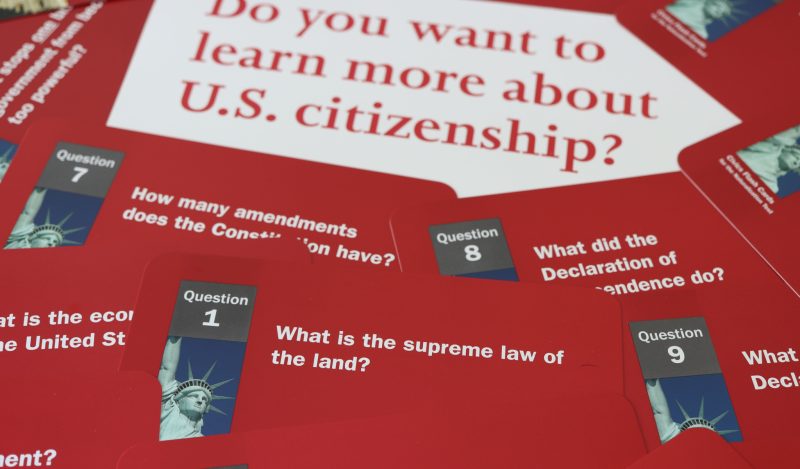Every lawyer knows words have meaning. The words legislators use must be clear and unambiguous so that any person can understand what the law requires. The clearer the terms, the less room for multiple interpretations of the same sentence. The clearer the words, the less likely the law would be struck down by a court for being overly broad or vague.
Unequivocal words are further essential when our legislature expects bureaucratic executive agencies to enforce these laws. Since bureaucrats in Washington are unelected and mostly unconfirmed administrators of our federal laws, all of their actions are only authorized as set forth in the Administrative Procedures Act (“APA”). It is from this act that most ABC federal agencies are given the power and discretion to decide what laws enacted by Congress say and how to enforce those laws.
When Congress enacted the Immigration and Nationality Act in 1959, there were no public health or vaccine-related requirements to lawfully immigrate to the United States, except for active contagious infections. This changed in 1996, when Congress passed sweeping legislation creating vaccine immunity laws for pharmaceutical companies and the Vaccine Injury Compensation Fund.
Civil lawsuits against vaccine manufacturers for vaccine injuries were a driving force behind the 1996 vaccine legislation. Legislators in Congress feared that tort lawsuits for vaccine-induced injuries would bankrupt manufacturers and deter pharmaceutical companies from continuing to produce vaccines that Congress believed were overall beneficial to public health. Although every other pharmaceutical product on the market does not have immunity from liability, vaccines are exempted.
(Traditionally, product liability actions encourage companies to ensure their products are thoroughly safety-tested before putting them to market lest companies face debilitating legal consequences. This legislation stripped the liability incentive for pharmaceutical companies to maintain the same safety standards as required for all other pharmaceutical drugs and products.)
Included in that act was an amendment requiring that immigrants get vaccinated against “vaccine-preventable diseases,” naming the specific diseases for which vaccines were available and leaving room for future vaccines by authorizing the Center for Disease Control and Prevention’s Advisory Committee on Immunization Practices (“ACIP”) to recommend additions to the statutorily defined list. The only qualifier for additional recommendations is that they are vaccinations that prevent disease.
Congress did not define the term “prevent” in this act. Black’s Law Dictionary provides “to stop from happening” as the definition. Thus, Congress must have intended for any vaccines on the immigration schedule to stop disease infection. This plain meaning is also logical: if the goal of the law is to prevent transmission of communicable diseases into the country, then the required vaccines must stop a person from getting infected and transferring the disease to others.
The CDC decided in 2009 to interpret the law in another way. Instead of following the plain meaning of “prevent” along with its logical objective to avoid disease spread, the CDC determined that the vaccine market was rapidly increasing and it needed to adjust how it was recommending vaccines for immigration. Currently, 15 of 25 recommended vaccines are required for immigration to the United States. (The CDC webpage only lists 14, but COVID-19 vaccines were added to the list in 2021 and are still required per the Technical Instructions for Civil Surgeons and the USCIS website.)
The CDC expanded its interpretation of Title 8’s vaccination requirements to include any vaccine that “protects against” a disease. Do “prevent” and “protect against” really differ so far in meaning? Yes, they do. To protect does not stop something from happening; rather, to protect is to shield from harm or keep safe. Under the CDC’s updated interpretation, ACIP is allowed to recommend that US Citizen and Immigration Services (“USCIS”) require any vaccine, even if it allows a person to contract and transmit a disease but be asymptomatic or exhibit less-severe symptoms. For instance, the seasonal influenza vaccine is required even though it is well-known that the vaccine does not always prevent infection.
In reviewing the CDC’s justification for the amendment, it is clear that the CDC understood Congress’s addition of vaccine requirements for immigration as a tool to prevent disease outbreaks and reduce risk to the general public. So why, then, would the agency decide to reduce the standard from stopping transmission, as authored by our elected legislators in Congress, to only protecting from harm? This is an open question, especially when the required vaccines may only shield the vaccinated immigrant from symptoms while still leaving the public-at-large exposed to disease.
This standard is akin to the question of, “If a tree falls in the woods when no one is around, does it make a sound?” Obviously, there is no one there to hear the sound; no one is disturbed by its occurrence. Here, “if all of the vaccinated immigrants and citizens are rendered asymptomatic though capable of infection and transmission, is anyone going to know there’s an outbreak of infection?” The CDC’s model for vaccine recommendations are only hiding the symptoms, not stopping the diseases.
The problems with the CDC’s expansion of Title 8 vaccination requirements are two-fold: first, it defies the authority under the APA and the US Constitution; and second, it comes at a cost to families and persons attempting to lawfully immigrate to the US. We are truly engulfed in a never-before seen constitutional crisis today with the unprecedented expansion of federal control and runaway train of bureaucratic federal agencies, particularly noticeable in the realm of “public health.”
The US Constitution provides that only Congress has the power to enact federal laws. When the CDC amended its interpretation of Title 8, it created an additional requirement for immigration that was not enacted by Congress. It required all immigrants to take recommended vaccines, not all of which prevent disease. Each of these vaccines carry health risks; otherwise, the Vaccine Injury Compensation Fund would not exist. The only real exceptions are moral/religious objections to all vaccines, contraindications to specific vaccines, or if a specific vaccine is inappropriate based on the age of the immigrant.
If an applicant cannot produce proof of vaccination or qualify for one of the waivers, the immigrant must take the vaccine(s), even if it had been previously administered. Taking multiple vaccines at the same time or additional doses of a previous vaccine may carry health risks, and the civil surgeons are not the immigrant’s physician. An interesting question about the immigration medical exam is whether civil surgeons are required to provide informed consent prior to administering any vaccines to the applicant. Obtaining informed consent for vaccination is not listed as required under the Technical Instructions.
Although this “protect-against” interpretation has been in use for more than a decade, the real question of its validity arose as a result of the covid pandemic. ACIP began recommending (nay, requiring) the experimental, EUA-only vaccines for immigration even after CDC already knew that the vaccines were not preventing transmission or infection. President Biden’s Administration later told NBC News that immigrants at the US-Mexico border would be required to get vaccinated against covid or be deported. Additionally, the vaccine was also imposed for more than a year on non-immigrant travelers visiting the US.
Under the Emergency Use Authorization Act, the ratified International Covenant on Civil and Political Rights Treaty, and the codified Belmont Report, Congress provided that persons have the right to refuse any experimental or EUA product. No person can demand anyone take an EUA product because Congress left that as a private medical decision between the patient and their doctor. Yet, the covid vaccines are mandated for immigration.
The natural consequence of refusing the covid vaccine for an immigrant is now deportation or denial of the visa application. Generally speaking, denial of a visa is not able to be challenged in a US Court due to the doctrine of consular nonreviewability. Looking at the real effects, unvaccinated persons who have been lawfully living in the US for years–even prior to covid–now trying to adjust their status risk being uprooted and sent to a country they have not called home in a long time. US citizens’ immigrant spouses are at risk of green card denial or deportation if unvaccinated, even though the citizen-spouse is not mandated to be vaccinated.
When looking back at the original purpose of the law–to prevent disease transmission–how do either of these outcomes accomplish the legislative intent? Are unvaccinated US citizens less likely to transmit diseases than immigrants? Are unvaccinated noncitizens who have lived here throughout and prior to the pandemic any greater risk to the US public when they adjust status to permanent residency? Why must immigrants take vaccines, like covid and influenza, when they do not prevent disease?
The overregulation of personal and private medical decisions by our federal government has truly led to nonsensical results in contradiction to US law and to the detriment of families and our society as a whole. Coercing vaccination on migrants at the border by threatening them with deportation is a human rights violation. Forcing immigrants to vaccinate to live with their US family members is a human and constitutional rights violation. Mandating lawful US residents get vaccinated to adjust status when it is not required of US citizens is a human, civil, and constitutional rights violation.
Representative Thomas Massie (R-KY) introduced a bill on July 19, 2023 to at least end the ACIP requirement mandating covid vaccines for immigrants, recognizing that families are still harmed by the CDCs relentless push for mass-covid vaccination among adults and children. Certainly, this step to reign in this incorrigible agency is heading in the right direction.
Yet, the question remains: Will Congress prevent the CDC and USCIS from continuing to violate Title 8 with its unlawful immigration vaccine schedule? Or will we allow them to continue to harm persons and families with their incessant vaccine obsession?
The USCIS does not need vaccines to protect the US against disease–indeed, the only health requirement to immigrate to the US for most of the nation’s history was no active, contagious infection.
On the contrary, public servants must interpret the Constitution and the laws to protect us against the federal agencies’ encroachment on personal liberties, like medical autonomy. If the agencies will not follow the clear law and only require vaccines that prevent disease transmission, then the agencies should be divested of their authority.
Published under a Creative Commons Attribution 4.0 International License
For reprints, please set the canonical link back to the original Brownstone Institute Article and Author.









